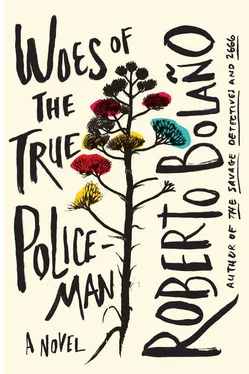In Mariño’s telling of the story, in what might be called a curious aside, there is something that stands out.
Mariño describes Emilio Hernández’s conversation — his labored conversation — with the town elders. Hernández, impatient and ill at ease, doesn’t dismount. His horse prances in front of the doorway where the old men of Villaviciosa are taking shelter from the sun. The old men speak with indifference and reserve. They speak of time, the seasons, the harvest. Their faces seem carved from stone. Hernández, meanwhile, shouts and erupts with ambiguous threats that even he doesn’t understand. Mariño hints that Hernández is afraid. His face is covered in sweat and dust from his long ride. His pistol remains holstered, but several times he moves as if to draw it. The old men spook him. He’s tired and he’s young and impetuous. Still, a glimmer of caution tells him that it’s best not to back himself into a corner. His men reluctantly search the town for something vague, hampered by the villagers’ passivity and absolute lack of cooperation. Hernández admonishes the villagers for their attitude. We’ve come to help you, he says in reproach, and this is how you repay us. The old men are like turtles. Then Mariño puts the following question in Hernández’s mouth, simple and unambiguous: what do you want? And the old men respond: we want to improve ourselves . That’s all. The elders of Villaviciosa have spoken and their words will go down in history: they want to improve themselves.
Her mother instilled in her a love of the French poets. Rosa remembered her sitting in a green armchair, a book in her hands (long, thin, very white hands, almost translucent), reading aloud. She remembered a window and the silhouettes of three modern buildings, her parents knew the names of the architects, behind which lay the beach and the sea. The three architects hated each other fiercely and her parents joked about it. When the sun went down her mother would sit in the chair and read French poems. Rosa couldn’t remember the names of the books but she could remember the names of the poets. Sometimes her mother cried. The tears rolled down her cheeks and then she left the book open on her lap, smiled at Rosa (who was next to her, sitting on a pouf or lying on the rug, drawing), dried her tears with a handkerchief or with the sleeve of her blouse, and for a few seconds, not crying anymore, sat quietly gazing at the silhouettes of the three buildings and the rooftops of the lowest buildings. Then she picked up the book and began to read again as if nothing had happened. The poets were Gilberte Dallas, Roger Milliot, Ilarie Voronca, Gérald Neveu …
When they left Rio they abandoned the books, except for Neveu’s Fournaise obscure . In Paris (or Italy?) she came across the poets again: they were all in the anthology Poètes maudits d’aujourd’hui: 1946–1970 , by Pierre Seghers. A bunch of suicide victims and failures, alcoholics and head cases. Her mother’s poets.
True, her mother also read her the poems of Éluard, Bernard Nöel (whom she liked very much and who often made her laugh), Saint-John Perse, even Patrice de la Tour du Pin, but it was the maudits d’aujourd’hui whom she remembered or thought she remembered with the most disquiet, names that were mostly unknown in Brazil or Argentina or Mexico and that made Edith Lieberman cry, reminding her perhaps of another life, of her break with that other life, when she was a student at the Collège Français and she dated boys from the Jewish neighborhood, when she listened to Brahms and didn’t miss a single Audrey Hepburn movie. Perhaps her mother, from that Rio apartment, saw herself as another French maudit poet, and liked — as only the maudits like — to contemplate scenes of a happiness spurned but in the end sadly lost. And Rosa thought: lost at the moment when the man who would be my father appeared with his proletarian vanguard and his wildly ambitious plans. And if he hadn’t appeared, would she and her mother be in Chile now, living in Santiago without a care in the world, happy as can be, sharing their little news each night, always together? But the louse of the proletarian vanguard had suddenly appeared, as if teleported in by fate. That was a fact, and now nothing could be changed. Probably they wouldn’t be in Chile, anyway, and besides, the little she knew about the country horrified her. Even the Chilean accent, which so many years later her father still hadn’t lost, was jarring, unpleasant, affected. She, of course, didn’t talk like that. Once she wondered what accent she had, and she came to the conclusion that she had none: she spoke a United Nations Spanish. Of the maudits , Gilberte Dallas was her favorite. Her mother liked Gérald Neveu or Ilarie Voronca, but Gilberte Dallas, La Gilberte, was the best. She imagined her tall and bony, her face like Greta Garbo’s but with two scars on each cheek like the women of some African tribes. Sometimes she didn’t smile and seemed sad, but as a rule she was cheerful, her gestures abrupt and her tongue swift. Very elegant: what suited her best were gauzy dresses, silk tunics, feathered hats, and sporting attire. When, years later, she read Anne Clancier’s introduction to the poems of Gilberte H. Dallas, 1918–1960, she realized that she had been fated to love her. Anne Clancier: “Une fillette de dix ans, allongée dans une barque, flotte sur la mer, à midi. Elle essaie de fixer le soleil, attendant de ses rayons la mort et la délivrance. Elle se croit mal aimée, abandonnée de tous, elle éspère retrouver au-delà de la mort la mère à jamais perdue. Lorsqu’on découvre l’enfant, après des heures de recherches, elle est inconsciente, frappée par l’insolation; on réussit à la sauver et il lui faut poursuivre sa route. Ce souvenir d’enfance nous livre la clef de la vie et de l’œuvre de Gilberte Dallas. Perpétuellement à la recherche d’une mère disparue précocement, désespérant de trouver un contact sécurisant avec un père malade…”
Poets whom children should be forbidden to read. At the age of fifteen she found her own maudits . First Sophie Podolski and Le pays où tout est permis , then Tristán Cabral, then Michel Bulteau and Matthieu Messagier. At sixteen she grew tired of them and returned to Gilberte Dallas. The sound of the words reminded her of her mother. She read her aloud, alone, when her father had gone out or was in class, and the strains of Gilberte brought back the green armchair in Rio and her mother gazing out the window at the three rival silhouettes and the treetops of the Paseo Marítimo and the sea a few yards beyond. And then her mother told her stories about what she was like as a baby and what she would be like when she was grown-up and beautiful. And she no longer needed to read Gilberte because the kisses they exchanged and her eyes closing were more powerful and soothing than words.
Rosa Amalfitano discovered that her father slept with men a month after she arrived in Santa Teresa, and the discovery worked on her like a stimulant. What a bitter pill! she said to herself, unconsciously quoting the heroine of a Bioy Casares story that she was reading. Then she began to tremble like a leaf and hours later, at last, she was able to cry. Earlier, Amalfitano had bought a TV set and video player in which she had shown no interest. From that day on, as if under an evil spell, Rosa stopped reading books and began to go through two or even three movies a day. Amalfitano, who tried to speak freely with his daughter on any subject, had done his best to warn her. In a long and chaotic conversation before they left for Mexico, using an allegory that even he didn’t understand and logic that later struck him as weak at best and idiotic at worst, he tried to explain to her that sexual tastes aren’t fixed, or at least not necessarily. At the root of his argument was an attempt to console himself — and also, hypothetically, his daughter — by reasoning that if the Eastern Bloc could crumble, so, too, could his thus far unequivocal heterosexuality, as if the two phenomena were linked or as if one were the logical consequence of the other. A kind of domino effect on the plane of affective inclinations, though an odd one, since Amalfitano was always critical of actual socialism. But Rosa literally didn’t hear him, being distractable by nature and used to her father’s long soliloquies, so that she had to discover for herself the activities to which he devoted himself while she was in school when one afternoon she returned earlier than usual. And though Amalfitano realized in horror that his daughter had seen him, and Rosa knew that he knew, they never discussed it. That same night, Amalfitano tried to explain who Castillo was, what had happened in Barcelona, what was happening inside of him, but Rosa was categorical. About this there could be no discussion. Saddened, Amalfitano obeyed and as the days went by, in his own way, he forgot or liked to think he had forgotten the incident. Rosa couldn’t.
Читать дальше








![О Генри - Бляха полицейского О’Руна [The Badge of Policeman O'Roon]](/books/405347/o-genri-blyaha-policejskogo-o-runa-the-badge-of-po-thumb.webp)



